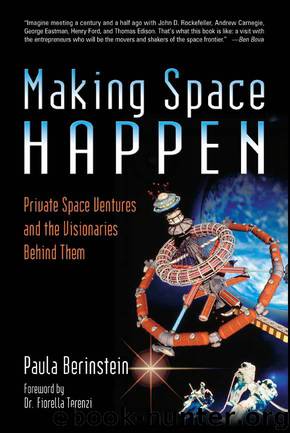Making Space Happen: Private Space Ventures and the Visionaries Behind Them by Paula Berinstein

Author:Paula Berinstein [Berinstein, Paula]
Language: eng
Format: epub
Publisher: Independent Publishers Group
Published: 2002-04-30T21:00:00+00:00
This state of affairs is not generally known among the public. Movies like Apollo 13 and JPL press conferences paint a picture of teams of scientists all working together on some very important project. In fact, that way of working belongs far more to the engineers than to the scientists. Mendell says, “Most of NASA’s engineers are a different culture than scientists. They work in hierarchical, militaristic organizations; orders come down, money appears at the top and is distributed down through the hierarchy based on function. And they don’t do anything until the money comes down and they have a requirement. The scientist never does not do anything. The scientist is always creating something or working on something or making something. But an engineer waits for the assignment.”
Which makes engineers sound awfully passive. But that’s part of the NASA culture. “The problem is that if you say anything that’s kind of off the mainstream, people don’t know how to deal with it. They don’t want to go to their boss and say, ‘We ought to be studying this.’ ‘Who told you that? What’s the upside potential?’ Even though it might be a good idea philosophically.”
He offers an example that shows how ideas percolate at the agency.
NASA just recently got an instruction from OMB [the federal Office of Management and Budget] to do some planning for the next decade, and he’s [the guy who’s in charge of it] been through all the ropes since the Space Exploration Initiative [Bush-the-elder’s proposed program back in 1989], and he thinks he’s seen every idea that every human being and a few aliens have had about how to go into space. And he wants to know what is there that we can bring to the Office of Management and Budget that looks like it might help create a robust civil space program and do something very significant by 2010. What is the answer, what do we bring to them? Well, there’s something that’s been floating around that Bruce Murray began promoting about a year ago called robotic colonies. Maybe because JPL loves robots. Anything that has lots of robots JPL’s in favor of. So, the idea is that the settlement of a planet occurs in certain stages. First of all, you kind of go by and look at it. Then you put something in orbit around it and kind of study it. Then you start landing things that are robots, and then normally the next stage is you land human beings to do something. Now they’re talking more about an enhanced robotic stage. In other words, you have not only just a robot do a few things but you actually have some kind of a robotic complex that you develop that does more elaborate things than just picking up something or pointing a beam at something. That kind of grows. And then that precedes the human presence. It’s a little vague, but it’s getting to be popular.
I’m associated with something called International Space University, and their main activity is a summer program for young professionals from around the world.
Download
This site does not store any files on its server. We only index and link to content provided by other sites. Please contact the content providers to delete copyright contents if any and email us, we'll remove relevant links or contents immediately.
Life 3.0: Being Human in the Age of Artificial Intelligence by Tegmark Max(4516)
The Sports Rules Book by Human Kinetics(3593)
ACT Math For Dummies by Zegarelli Mark(3567)
The Age of Surveillance Capitalism by Shoshana Zuboff(3429)
Blood, Sweat, and Pixels by Jason Schreier(3137)
Unlabel: Selling You Without Selling Out by Marc Ecko(2987)
Urban Outlaw by Magnus Walker(2950)
Hidden Persuasion: 33 psychological influence techniques in advertising by Marc Andrews & Matthijs van Leeuwen & Rick van Baaren(2787)
The Pixar Touch by David A. Price(2744)
Bad Pharma by Ben Goldacre(2733)
Project Animal Farm: An Accidental Journey into the Secret World of Farming and the Truth About Our Food by Sonia Faruqi(2667)
Brotopia by Emily Chang(2593)
The Content Trap by Bharat Anand(2495)
Slugfest by Reed Tucker(2420)
The Airbnb Story by Leigh Gallagher(2375)
Kitchen confidential by Anthony Bourdain(2310)
Coffee for One by KJ Fallon(2010)
Smuggler's Cove: Exotic Cocktails, Rum, and the Cult of Tiki by Martin Cate & Rebecca Cate(1986)
Beer is proof God loves us by Charles W. Bamforth(1928)
